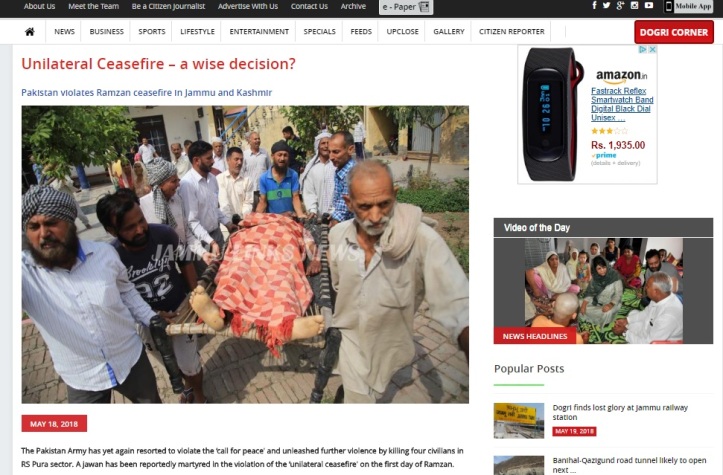Four civilians were killed and a jawan was martyred in the ceasefire violation by Pakistan, in the RS Pura sector of Jammu. This comes a day after India called for peace through ‘unilateral ceasefire’, at least, during Ramzan and Amarnath Yatra.
Pakistan has yet again resorted to violating the ceasefire and unleashed further violence by killing civilians and security personnel, on the first day of Ramzan. This has shattered the hopes for returning peace and normalcy to the state.
Unilateral, but conditional ceasefire during Ramzan
The Centre announced a conditional ceasefire in Jammu and Kashmir for the peaceful month of Ramzan and upcoming Amarnath Yatra. Rajnath Singh, Union Home Minister, asked the defence forces to defer all operations against the terrorists until provoked.
The Home Ministry stated: “The decision was taken to help the peace-loving Muslims observe Ramzan in a peaceful environment. Security Forces to reserve the right to retaliate if attacked or if [it is] essential to protect the lives of innocent people. The government expects everyone to cooperate in this initiative and help the Muslim brothers & sisters to observe Ramzan peacefully and without any difficulties.”
It also underlined the importance of isolating the forces that bring a bad name to Islam by resorting to mindless violence and terror.
The ceasefire will be in place during the holy month of Ramzan starting from mid-May till the completion of the Amarnath Yatra in August.
The killing of a tourist from Tamil Nadu in stone pelting turned out to be the flashpoint, which reflected the deteriorating situation of the Valley. Mehbooba Mufti, Chief Minister of Jammu and Kashmir, convened an all-party meeting, to seek consensus to propose the Centre for a unilateral ceasefire in the state.
Unilateral Ceasefire is a failure, history says
19 November, 2000- 31 May, 2001: The Atal Bihari Vajpayee government had negotiated with the top leadership of Hijbul Mujahiddin, and called for ‘Non-Initiation of Combat Operations’ (NICO). It was extended three times.
The first bilateral ceasefire lasted for only 18 days. Not accepting the conditions put forward by the terrorist outfit, India then decided to go for a unilateral ceasefire. The second ceasefire call was not adhered to by the militants, and hence, called off.
The ceasefire had ultimately failed to achieve its objective of peace. Instead, it led to an increase in militancy across LOC, killing 129 people, including 43 security persons.
The terrorists regrouped themselves and planned attacks on J&K Assembly (1 October, 2001) and Indian Parliament (13 December, 2001). They also attacked Army cantonment, Police Control Room and Srinagar airport.
During this period, the first Kashmiri fidayeen suicide bomber Afaq Ahmed Shah blew himself along with an explosive-laden car outside Badami Bagh Cantonment area, killing four security personnel.
It also saw an attack on Farooq Abdullah, former Chief Minister of Jammu and Kashmir.
What does ‘ceasefire’ mean for the security forces?
The holistic and highly acclaimed ‘Operation All Out’ which had given the security forces, an upper hand against the militants will be halted.
It will be a breather from the Cordon and Search Operations (CASO) and other pro-active anti-terrorism operations.
If the militants reciprocate the ceasefire call, lesser security persons would be killed.
Also, there is a high probability that the militants regain their position in the valley, as happened earlier in 2000-2001.
What does ‘ceasefire’ mean for the state?
The state might observe peaceful Ramzan and Amarnath Yatra, which can create an environment for sustainable dialogue, or it can be the other way round, as well.
People of the valley have witnessed killings of civilians, security personnel, militants. It is hoped that the ceasefire would provide relief to the people, who have suffered at the hands of militancy and anti-militancy operations for decades.
The business and tourism would flourish again if peace returns to the valley.
As many as 43 local youths have joined militant groups in the first few months of this year, but People’s Democratic Party (PDP) hopes that ceasefire may prevent youth from taking up arms.
The normalized situation can be conducive for holding Parliamentary polls from Anantnag-Pulwama, which is to be held in 2019. The seat is lying vacant since Mehbooba took over as CM in April 2016. The polls could not be held due to security concerns.
Also: Read my article at JAMMU LINKS NEWS
Unilateral Ceasefire – a wise decision?
http://www.jammulinksnews.com/newsdetail/156513/Jammu-Links-News-Unilateral_Ceasefire_%E2%80%93_a_wise_decision?


